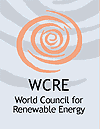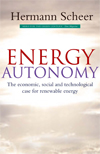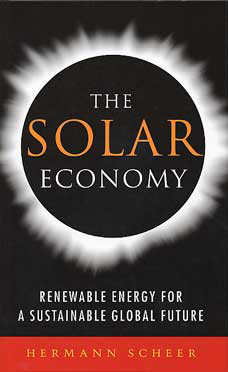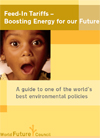Publications
 Article published in UNEP Our World Magazine, December, 2005
Article published in UNEP Our World Magazine, December, 2005Hermann Scheer describes how photovoltaic solar energy conversion offers humanity a unique opportunity and calls for political programmes to promote it. Photovoltaic energy (PV) is the primadonna of renewable energy technology. Currently, it only generates just a small part of total renewable energy supply, less than wind, hydro power or biomass. But it also bears by far the biggest potential - larger than that of all other renewable energy sources, larger than anything to which fossil fuels and nuclear power could ever aspire. Photovoltaics are the most promising of all energy technologies, giving us the best option to overcome global energy crises.
 WCRE paper, June 15th, 2002
WCRE paper, June 15th, 2002
Considerations - The unfulfilled promise of the Agenda 21
 Article published as an extract of Hermann Scheer: Energy Autonomy. The Economic, Social and Technological Case for Renewable Energy, December 2006
Article published as an extract of Hermann Scheer: Energy Autonomy. The Economic, Social and Technological Case for Renewable Energy, December 2006
“Solar or nuclear” was the title of a debate on Austrian television I conducted several years ago with a well-known professor of atomic physics. The professor was not one of those members who likes to whitewash the risks of nuclear energy. But he was convinced of the indispensability of nuclear energy. He regarded renewable energy as something that (unfortunately) did not have enough usable potential to satisfy people’s energy needs. His remarks on the subject amounted to a grab bag of grotesque assumptions, all of which were easy to refute with a few empirical facts – like his assertion that the energy expended on producing a solar facility would be higher than its energy output. After the broadcast he told me in a voice that was both moved and moving: “Measured by what you have said, my professional life was misguided.”
 WCRE paper, June, 2002
WCRE paper, June, 2002
Formation of the Group of Renewable and Efficient Energy Nations (GREEN Nations)
Considering the importance of Sustainable Development; the importance of international agenda setting as a crucial factor for global awareness about the central challenges of world development; the lack of consensus about Renewable Energy in the World Summit on Sustainable Development process...
 Article published in Die Zeit, July 29th, 2004
Article published in Die Zeit, July 29th, 2004 Nuclear energy is still too expensive and too dangerous. Huge amounts of water are needed in a time of increasing water shortage. Uranium supplies are limited. In Europe $1 trillion was spent on nuclear research while renewable energy fell by the wayside.
 WCRE memorandum, September, 2001
WCRE memorandum, September, 2001
Beyond the Kyoto Protocol: Renew the Climate Protection Strategy with Renewable Energy
The global phasing in of Renewable Energy technologies offers a comprehensive and uncomplicated solution. The time has come to adopt a new paradigm in saving the global environment. The Kyoto process is ready to be transformed from its present symptom-oriented and abstract basis to a more practical and solution geared approach. The World Council for Renewable Energy, founded in Berlin in June 2001, appeals to the participants of the World Climate Conference: to embark on a new path, and prioritize renewable energy in global climate protection campaigns.
 Article published as Foreword of "The Solar Economy", May 2004
Article published as Foreword of "The Solar Economy", May 2004
‘Let’s improve the atmosphere’ - that was how the German government greeted delegates to the conference on climate change held in Bonn in July 2001, the eighth such conference since 1992. Yet even before the conference took place, it was abundantly clear that even if the Kyoto Protocol were to be implemented in full through to 2012 without being watered down, the most it could achieve would be to bring emissions back down to the already dangerously high levels of 1990. On the basis of existing agreements, the objective was no longer to improve matters, but merely to prevent them getting any worse. And while the negotiations rumble on, the climate situation remains precarious. A short study undertaken by the Wuppertal Institute predicts that by 2012, global emissions will actually have risen by ten per cent. The Kyoto debate would appear to have run its course.



 Action Plan for the Global Proliferation of Renewable Energy (pdf)
Action Plan for the Global Proliferation of Renewable Energy (pdf)